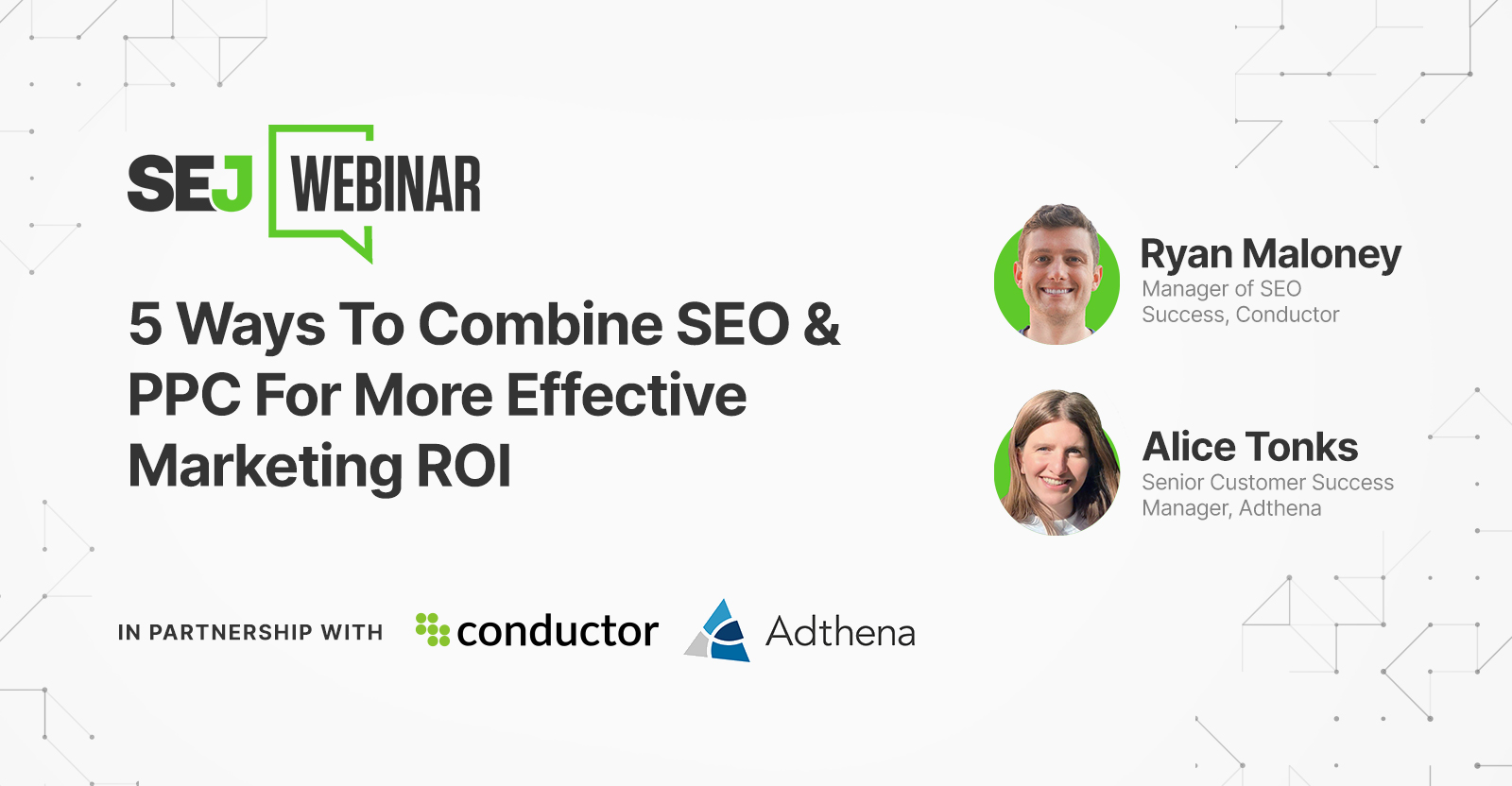As a marketer facing economic uncertainty (and the resulting budget cuts), it’s more important than ever to evaluate your company’s digital strategy.
So, how do you maximize results if you have fewer resources and funds to work with?
How should you allocate your marketing budget to generate the highest return on investment (ROI) possible?
On February 22, I moderated a webinar with Ryan Maloney, Manager of SEO Success at Conductor, and Alice Tonks, Paid Search Customer Success Manager at Adthena.
Maloney and Tonks walked through five ways you can effectively leverage paid and organic search to boost your performance and grow your business this year.
Here is a summary of the webinar. To access the entire presentation, complete the form.
The State Of Search
As companies begin to strap up their wallets due to a decrease in consumer spending, we’re learning that it’s becoming even more important to use organic strategies to pick up as much traffic as possible.
But before we dig deeper into how paid and organic work together, let’s differentiate organic search from paid search first.
An Organic Search (Search Engine Optimization or SEO) result is any search query result on a search engine results page (SERP) that is earned rather than paid for.
On the other hand, Paid Search (Search Engine Marketing or SEM) results are paid advertisements that appear on the SERP.
[Learn how to use both to ramp up your success] Instantly access the webinar →
5 Ways To Combine SEO & SEM For More Effective Marketing ROI
Here’s the winning formula to transform your business and increase your revenue: combine SEO with SEM for unbeatable marketing ROI.
Here are five ways to make sure your online success soars.
1. Allocate Paid Search Spend Using Organic Search Performance Insights.
Start by using keyword research to understand where you’re underperforming.
This will help you understand your target audience and decrease unnecessary ad expenditures.
[Learn how] Instantly access the webinar →
2. Inform Your Content Strategy With SEM Keyword Performance.
Identify your most valuable paid terms then work with your content writers to incorporate high-value terms into organically-driven content pieces.
[Get more ROI with SEO & SEM] Instantly access the webinar →
3. Perform Competitive Research Using Paid & Organic Insights.
Get to know your competitors and categorize them accordingly. Then, cross-analyze them with your own paid & organic research to get a clearer picture of the landscape.
[Get a real-life example] Instantly access the webinar →
4. Incorporate SEO Best Practices When Creating Paid Campaigns.
When creating paid campaigns, avoid self-cannibalization of your organically targeted keywords in order to align the technical health of your website.
[Learn how self-cannibalization hurts your ROI] Instantly access the webinar →
5. Enable Cross-Team Communication & Collaboration.
After you get the full story, monitor and share the performance with both SEO and SEM teams. Then, work together to own your targeted SERPs.
[Slides] 5 Ways To Combine SEO & SEM For More Effective Marketing ROI
Here’s the presentation:
Join Us For Our Next Webinar!
How A Customer Journey Influences Your Content Strategy
In this session, Wayne Cichanski, Vice President of Search and Site Experience at iQuanti, and Jill Perlberg, Vice President and Head of Content Strategy and Client Experience Marketing at Northwestern Mutual, discuss ways to master the customer journey and move prospects from interest to action.
Image Credits:
Featured Image: Paulo Bobita/Search Engine Journal
window.addEventListener( 'load2', function() { console.log('load_fin');
if( sopp != 'yes' && !window.ss_u ){
!function(f,b,e,v,n,t,s) {if(f.fbq)return;n=f.fbq=function(){n.callMethod? n.callMethod.apply(n,arguments):n.queue.push(arguments)}; if(!f._fbq)f._fbq=n;n.push=n;n.loaded=!0;n.version='2.0'; n.queue=[];t=b.createElement(e);t.async=!0; t.src=v;s=b.getElementsByTagName(e)[0]; s.parentNode.insertBefore(t,s)}(window,document,'script', 'https://connect.facebook.net/en_US/fbevents.js');
if( typeof sopp !== "undefined" && sopp === 'yes' ){ fbq('dataProcessingOptions', ['LDU'], 1, 1000); }else{ fbq('dataProcessingOptions', []); }
fbq('init', '1321385257908563');
fbq('track', 'PageView');
fbq('trackSingle', '1321385257908563', 'ViewContent', { content_name: 'combine-seo-sem-roi-conductor', content_category: 'content paid-media pay-per-click seo webinar' }); } });

